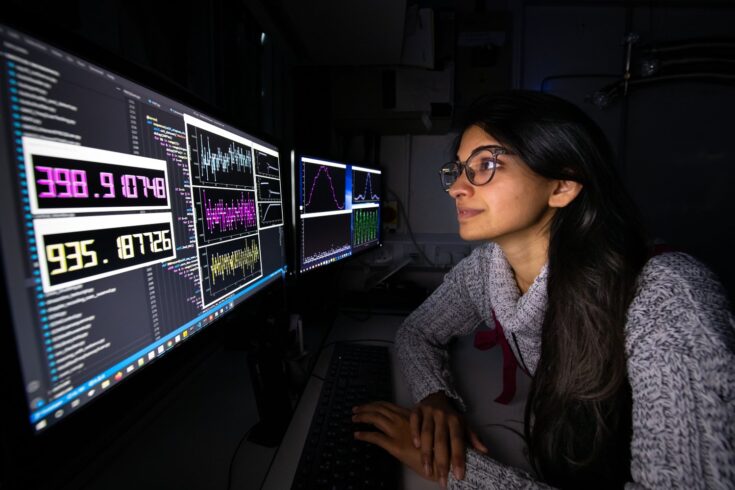This helps overcome a key obstacle to building a commercial quantum computer.
The milestone achieved by a team from the University of Sussex and Brighton-based quantum computer developer Universal Quantum, allows chips to be linked like a jigsaw.
On track to useful quantum computers
It means that many more qubits, the basic calculating unit, can be joined together than is possible on a single microchip. This will make a more powerful quantum computer possible.
The project, which has been backed by the Engineering and Physical Sciences Research Council (EPSRC), has also broken the world record for quantum connection speed and accuracy.
The scaling of qubit numbers from the current level of around 100 qubits to nearer 1 million is central to creating a quantum processor that can make useful calculations.
The significant achievement is based on a technical blueprint for creating a large-scale quantum computer, which was first published in 2017 with funding from EPSRC.
Within the blueprint was the ground-breaking concept successfully demonstrated with this research of linking quantum computing modules with electrical fields.
Unlocking UK potential
The UK is a leader in the global race to develop useful quantum computers, which represent a step-change in computing power.
Their development may help solve pressing challenges from drug discovery to energy efficient fertiliser production. But their impact is expected to sweep across the economy, transforming most sectors and all our lives.
Potential to scale up
Winfried Hensinger, Professor of Quantum Technologies at the University of Sussex and Chief Scientist and co-founder at Universal Quantum said:
As quantum computers grow, we will eventually be constrained by the size of the microchip, which limits the number of quantum bits such a chip can accommodate.
In demonstrating that we can connect 2 quantum computing chips, a bit like a jigsaw puzzle, and, crucially, that it works so well, we unlock the potential to scale up by connecting hundreds or even thousands of quantum computing microchips.
Speed and precision
The researchers were successful in transporting the qubits using electrical fields with a 99.999993% success rate and a connection rate of 2424 transfers per second. Both numbers are world records.
Dr Kedar Pandya, Director of Cross-Council Programmes at EPSRC, said:
This significant milestone is evidence of how EPSRC-funded science is seeding the commercial future for quantum computing in the UK.
The potential for complex technologies, like quantum, to transform our lives and create economic value widely relies on visionary early-stage investment in academic research.
We deliver that crucial building block and are delighted that the University of Sussex and its spin-out company, Universal Quantum, are demonstrating the strength it supports.
Institute of Physics award winner
Universal Quantum has been awarded €67 million from the German Aerospace Centre to build 2 quantum computers.
The University of Sussex spin-out was also recently named as one of the 2022 Institute of Physics award winners in the business start-up category.

